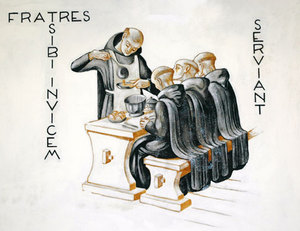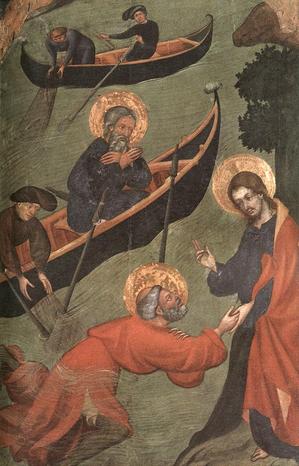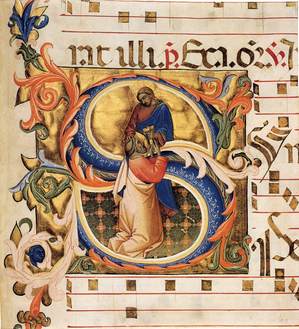
The daily grind makes us weary of the task at hand and sometimes we're also weary of the "nonsense" of other people. There are times in which we are just ugly. Our own fragile and sinful lives can get in the way of things. Sadly, sometimes we get hurt, and we hurt others.
I was re-reading parts of Luigi Giussani's Religious Sense this morning and then I saw that a friend made note of the Good zeal of monks (noted below) and I wondered... Why is it that we allow "wicked zeal of bitterness" to infiltrate our spirit and our relationships? Saint Benedict perceived a lack of coherence of what human beings say they believe and the lives lead. No doubt this same question/thought ought to concern every reasonable Christian if we are serious about faith in Jesus Christ and ultimate salvation. The tough thing about the Christian way of life is making sure that our faith informs our works and that we don't replace faith with good works thinking that what we do will absolve our poor behavior. The good zeal Benedict exhorts his monks to have is really applicable to all baptized Christians and not merely the "professional Christians."
Do we pay enough attention to reality? Am I too alienated from my own desires when I uncritically accept the ideas of others without doing the hard of work of verifying the truth of these ideas? Have I allowed wonder to take a back seat when looking at the reality I've been given by God? Have I sufficiently observed and understood what is in front of me? Have I love the Infinite, that is, the Triune God, to the best of my ability and without reservation? Where is my heart right now?
The Rule of Saint Benedict is insightful with regard to human nature: laziness, mediocrity, will not lead to ultimate happiness. That we have to put aside bitterness and that which does not build a deeper communion with God and neighbor. As Holy Father Saint Benedict and Father Luigi Giussani both said but in different ways: do we love?
Here is what the Rule of Saint Benedict says,
Just as there is a wicked zeal of bitterness which separates from God and leads to hell, so there is a good zeal which separates from evil and leads to God and everlasting life. This, then, is the good zeal which monks must foster with fervent love.... (72.1-3)
 Jesus invited us to meet. Saint Benedict's talked about it; a plethora of saints have talked about it; Fr Giussani constantly talked about it; Pope Benedict XVI talks about it: nothing can substitute for personally knowing Jesus. Want to be a Christian? Go and meet Christ in Scripture, in the Holy Eucharist, in personal and communal prayer, in doing good works. In short, meet Jesus Christ by the ears of your heart and in your minute by minute human experience.
Jesus invited us to meet. Saint Benedict's talked about it; a plethora of saints have talked about it; Fr Giussani constantly talked about it; Pope Benedict XVI talks about it: nothing can substitute for personally knowing Jesus. Want to be a Christian? Go and meet Christ in Scripture, in the Holy Eucharist, in personal and communal prayer, in doing good works. In short, meet Jesus Christ by the ears of your heart and in your minute by minute human experience.




